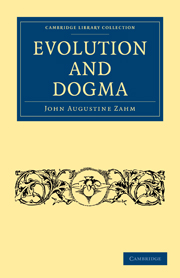Book contents
- Frontmatter
- PREFATORY NOTE
- Contents
- INTRODUCTION
- PART I EVOLUTION, PAST AND PRESENT
- PART II EVOLUTION AND DOGMA
- CHAPTER I MISCONCEPTIONS OF THEORY, ERRORS IN DOCTRINE AND MISTAKES IN TERMINOLOGY
- CHAPTER II MONISM AND EVOLUTION
- CHAPTER III AGNOSTICISM AND EVOLUTION
- CHAPTER IV THEISM AND EVOLUTION
- CHAPTER V THE ORIGIN AND NATURE OF LIFE
- CHAPTER VI THE SIMIAN ORIGIN OF MAN
- CHAPTER VII TELEOLOGY, OLD AND NEW
- CHAPTER VIII RETROSPECT, REFLECTIONS AND CONCLUSION
- AUTHORS AND WORKS CITED IN “EVOLUTION AND DOGMA.”
- GENERAL INDEX
CHAPTER III - AGNOSTICISM AND EVOLUTION
Published online by Cambridge University Press: 29 August 2010
- Frontmatter
- PREFATORY NOTE
- Contents
- INTRODUCTION
- PART I EVOLUTION, PAST AND PRESENT
- PART II EVOLUTION AND DOGMA
- CHAPTER I MISCONCEPTIONS OF THEORY, ERRORS IN DOCTRINE AND MISTAKES IN TERMINOLOGY
- CHAPTER II MONISM AND EVOLUTION
- CHAPTER III AGNOSTICISM AND EVOLUTION
- CHAPTER IV THEISM AND EVOLUTION
- CHAPTER V THE ORIGIN AND NATURE OF LIFE
- CHAPTER VI THE SIMIAN ORIGIN OF MAN
- CHAPTER VII TELEOLOGY, OLD AND NEW
- CHAPTER VIII RETROSPECT, REFLECTIONS AND CONCLUSION
- AUTHORS AND WORKS CITED IN “EVOLUTION AND DOGMA.”
- GENERAL INDEX
Summary
Nature and Scope of Agnosticism
A MORE popular form of error than Monism, or scientific Atheism, and one which is more wide-spread and devastating in its effects, is the newfangled system, if system it can be called, known as Agnosticism. To the superficial student it is not without color of plausibility, and by concealing the objectionable and repulsive features of Monism, it now counts more adherents, probably, than any other form of scientific error.
Like Monism, Agnosticism is a system of thought which has allied itself with the theory of Evolution, from which, as ordinarily understood, it is inseparable. Like Monism, it is a mixtum compositum of science, philosophy and theology, in which science and Evolution are predominant factors. And, like Monism, too, it is a new name for an old form of error. Unlike Monism, however, Agnosticism affects to suspend judgment, where Monism makes a positive assertion, or enters a point-blank denial. In many questions of fundamental importance, Agnosticism is ostensibly nothing more than simple doubt, or gentle skepticism, while Monism is always arrogant, downright affirmation, or negation. In its ultimate analysis, however, Agnosticism as well as Monism issues in a practical denial of a personal God, the Creator of the universe, and relegates Providence, the immortality of the soul, and the moral responsibility of man to a Divine Being, to the region of fiction.
Again, Agnosticism, like Monism, is peculiarly and essentially the product of a combination and a succession of causes and conditions.
- Type
- Chapter
- Information
- Evolution and Dogma , pp. 254 - 278Publisher: Cambridge University PressPrint publication year: 2009First published in: 1896



